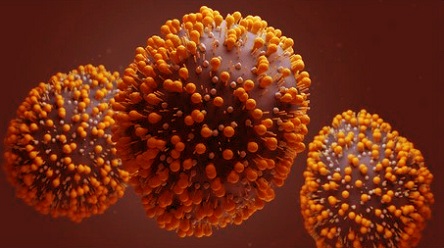Nikhil Prasad Fact checked by:Thailand Medical News Team Nov 22, 2024 1 year, 1 month, 2 weeks, 1 day, 7 hours, 8 minutes ago
Medical News: Respiratory Syncytial Virus (RSV) is a major cause of respiratory infections, particularly in infants and young children. Each year, RSV is responsible for millions of hospitalizations and tens of thousands of deaths among children under five. This highly infectious virus can also severely affect elderly individuals and those with weakened immune systems. While most cases result in mild symptoms, RSV can lead to life-threatening complications like pneumonia and bronchiolitis in vulnerable populations.
 Unveiling the Role of CX3CR1 in RSV Infections
Unveiling the Role of CX3CR1 in RSV Infections
The virus's ability to evade immune defenses and persist in the respiratory tract has made it a significant focus for researchers. This
Medical News report delves into groundbreaking findings about the role of a unique molecular pathway - the CX3CR1-CX3CL1 axis - in RSV infections. These discoveries could pave the way for more effective treatments and vaccines against this persistent pathogen.
The CX3CR1-CX3CL1 Axis: A Critical Interaction
At the heart of recent RSV research is the interaction between the virus and a specific receptor in the human body, known as CX3CR1. This receptor binds with a molecule called fractalkine (CX3CL1), which plays vital roles in immune cell recruitment and adhesion. RSV exploits this pathway to infect airway cells, using a specialized protein, the G glycoprotein, to mimic the natural binding of CX3CL1 to CX3CR1. This mimicry not only facilitates infection but also helps the virus evade detection by the immune system.
Research teams from the Instituto Nacional de Enfermedades Respiratorias Ismael Cosío Villegas in Mexico City, Mexico, have shed light on how this mechanism works. They found that RSV infection increases CX3CL1 levels, which in turn recruits CX3CR1-expressing immune cells to the infection site. However, instead of supporting recovery, this recruitment can sometimes exacerbate the infection.
Key Findings from the Study
1. CX3CR1 and RSV Entry
RSV uses its G glycoprotein to attach to and enter human airway epithelial cells via CX3CR1. Studies demonstrated that blocking CX3CR1 with antibodies reduced RSV infection rates, confirming the receptor's role as a co-receptor for the virus.
2. Immune Response Modulation
The interaction between RSV and CX3CR1 triggers a cascade of immune responses. In some cases, this leads to an overactive immune reaction, causing severe inflammation and lung damage. Interestingly, individuals lacking CX3CR1 experienced worse outcomes in RSV infections, suggesting the receptor also plays a protective role in regulating immune responses.
3. Genetic Variations Impact Disease Severity
People with a specific genetic variant of CX3CR1, known as M280, were found to be more susceptible to severe RSV-induced bronchiolitis. This variant is associated with reduced monocyte adhesion and impaired immune cell recruitment, leading to poorer control of the virus.
&
nbsp;
4. Vaccination Opportunities
Researchers explored using modified RSV G proteins that lack the CX3C motif as potential vaccine candidates. These modifications prevent the virus from binding to CX3CR1 while maintaining its ability to trigger an immune response. Early trials in animal models have shown promising results, with vaccines generating antibodies that block RSV without disrupting the natural functions of CX3CL1 and CX3CR1.
Implications for RSV Treatment and Prevention
The study underscores the dual role of the CX3CR1-CX3CL1 axis in RSV infections. While this pathway facilitates viral entry and immune evasion, it also plays a crucial role in resolving infections. This paradox highlights the complexity of RSV pathogenesis and the need for balanced therapeutic approaches.
New treatments targeting the CX3CR1-CX3CL1 interaction could help reduce RSV's impact. For instance, blocking RSV's ability to mimic CX3CL1 might prevent infection while preserving immune cell recruitment and function. Additionally, vaccines that focus on the modified G protein could offer protection without triggering harmful inflammation.
Conclusions and Future Directions
The interaction between RSV and the CX3CR1-CX3CL1 axis represents a double-edged sword. On one hand, it is a critical factor for RSV infection and immune evasion. On the other, it is essential for mounting an effective immune response. Understanding and manipulating this interaction could revolutionize RSV management.
Future research should explore:
-The long-term safety and efficacy of CX3C-mutated vaccines in human trials.
-Personalized treatments for individuals with CX3CR1 genetic variants.
-Broader implications of the CX3CR1-CX3CL1 axis in other viral infections.
With continued advancements, we may soon see innovative therapies that not only treat RSV more effectively but also prevent its recurrence, particularly in high-risk groups.
The study findings were published on a preprint server and are currently being peer reviewed.
https://www.preprints.org/manuscript/202407.0855/v1
For the latest RSV News, keep on logging to Thailand
Medical News.
Read Also:
https://www.thailandmedical.news/news/how-rsv-dodges-our-body-s-defense
https://www.thailandmedical.news/news/probenecid-found-to-inhibit-respiratory-syncytial-virus-replication
https://www.thailandmedical.news/news/respiratory-syncytial-virus-infections-in-infants-causes-a-variety-of-long-term-health-issues-later-in-life
